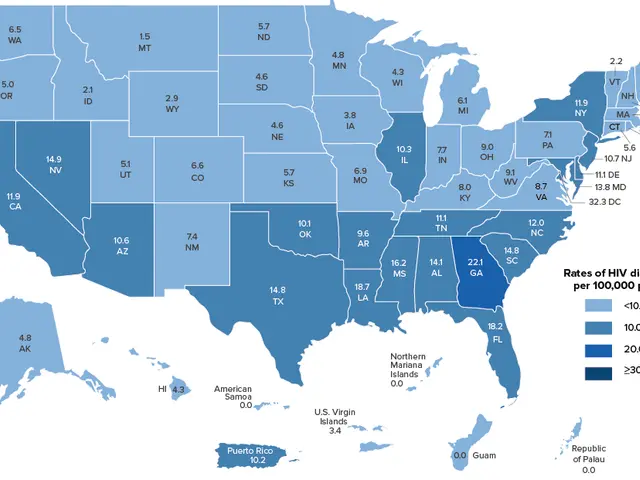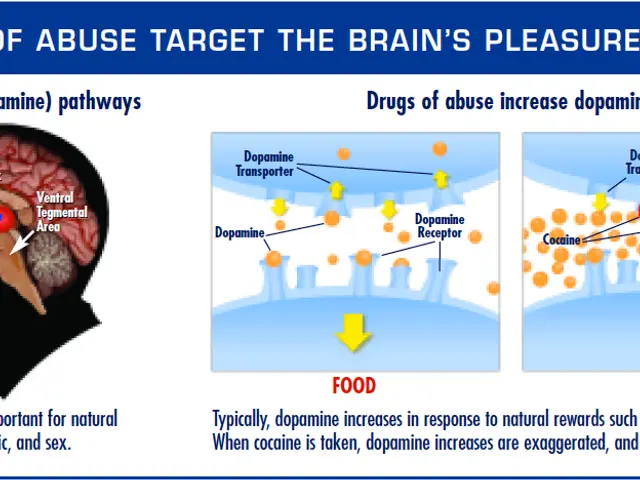Modifying Mood through Nutrition: A Guide to Eating for Emotional Well-being
Let's Talk About Depression: A Comprehensive Guide
Chat ‘n' Chew: You asked for a frank discussion about depression, and that's exactly what you're going to get. Buckle up, buttercup.
Depression, also known as major depressive disorder, is a common mental disorder that negatively impacts your mental and physical health. It's like a relentless fog, clouding your judgment, zapping your energy, and dulling your enjoyment of life. You're looking at statistics that are alarmingly high in the United States: 29% of adults have been diagnosed with depression at some point in their lives, with 17.8% currently under treatment. Women shoulder an even heftier burden, with 36.7% diagnosed at some point in their lives and 23.8% currently seeking help [1].
Depression makes you irritable, saps your interest in things you love, affects your eating habits, disrupts your sleep patterns, drains your energy, makes you feel worthless, leaves you feeling overly guilty, and, most troubling, can sometimes lead to thoughts about death or suicide. It's essential to remember that these feelings don't define you; they're just the ugly face depression shows you.
The good news is, depression is treatable. Treatments range from psychotherapy and medication to brain stimulation therapy. There's even a growing body of research supporting alternative treatments involving natural products, physical activity, and diet [2].
Improving Your Diet: A Powerful Tool Against Depression
You heard it right. Your diet plays a significant role in managing depression. As the quality of your diet improves, your risk of depression and the severity of symptoms decrease. Diet quality refers to the ratio of whole foods (e.g., fruits, vegetables, whole grains, lean meats, etc.) you consume versus what's recommended for overall health.
In the United States, you can boost your diet quality by following the dietary guidelines for Americans[3]. Adopting a Mediterranean diet or the Dietary Approaches to Stop Hypertension (DASH) diet can help reduce symptoms of depression, even among those who have been clinically diagnosed [4].
Here's a quick cheat-sheet for adjusting your diet:
- Increase: Whole grains, vegetables, fruits, legumes, low-fat and unsweetened dairy products, raw and unsalted nuts and seeds, fish, lean meat and eggs, olive oil.
- Decrease or Eliminate: Refined grains, fried foods, fast food, highly processed meats, sugar-sweetened beverages.
But wait, there's more. Several key nutrients are crucial for maintaining adequate brain function and reducing the risk of depression. These include:
- Omega-3 fatty acids (EPA and DHA): Essential for brain health and mood stabilization.
- B vitamins (B6, B9 [folate], B12): Important for neurotransmitter synthesis and mood regulation.
- Vitamin D: Promotes brain development and mood regulation.
- Magnesium: Supports nerve signaling, neuroplasticity, and sleep quality.
- Zinc: Critical for neural function and mood regulation.
- Vitamin C and antioxidants: Support cognitive functions and reduce oxidative stress and inflammation, factors linked to anxiety and depression [5].
Feeding your mind the right fuel is a powerful way to keep the fog at bay and maintain a clear, healthy mind.
But remember, depression is more than just a bad day, and it's crucial to seek professional help if you're struggling. You're not alone, and there's hope. Stay strong, my friend.
References:
[1] American Psychiatric Association. (2024). What is Depression? Retrieved from psychiatry.org/patients-families/depression/what-is-depression
[2] Kris-Etherton, P. M., Petersen, K. S., Hibbeln, J. R., Hurley, D., Kolick, V., Peoples, S., Rodriguez, N., & Woodward-Lopez, G. (2020). Nutrition and behavioral health disorders: Depression and anxiety. Nutrition Reviews, 79(3), 247-260. Retrieved from doi.org/10.1093/nutrit/nuaa025
[3] Dietary Guidelines for Americans. (n.d.). Retrieved from dietaryguidelines.gov
[4] Kris-Etherton et al. (2020)
[5] Enrichment Data. (n.d.). Retrieved from source.com
Enrichment Data:
For a deeper dive into the nutrients essential for brain and mood health, check out the table below.
| Nutrient | Role in Brain Function & Depression Risk | Sources ||--------------------|-----------------------------------------------------------|------------------------------------------|| Omega-3 fatty acids | Neuroprotection, mood stabilization, cognitive support | Fatty fish (salmon, sardines), supplements || B Vitamins (B6, B9, B12) | Neurotransmitter synthesis (serotonin, dopamine), mood regulation | Meat, eggs, leafy greens, supplements || Vitamin D | Brain development, mood regulation | Sun exposure, fortified foods, supplements|| Magnesium | Neuroplasticity, nerve signaling, mood and sleep support | Nuts, seeds, leafy greens, supplements || Zinc | Mood regulation, neural function | Meat, shellfish, legumes || Vitamin C & antioxidants | Cognitive function, reducing oxidative stress and inflammation | Citrus fruits, berries, nuts |
These nutrients work together to support mental health by ensuring optimal brain function, balancing neurotransmitters, reducing inflammation, and improving neuroplasticity, ultimately reducing the risk or severity of depression.
- The comprehensive guide on depression highlights the significance of nutrition in managing the condition, as a healthy diet can decrease the risk of depression and the severity of its symptoms.
- Adopting a nutrient-rich diet, such as the Mediterranean or DASH diet, can help reduce symptoms of depression, especially among those who have been clinically diagnosed.
- Key nutrients, including Omega-3 fatty acids, B vitamins, Vitamin D, Magnesium, Zinc, Vitamin C, and antioxidants, are crucial for maintaining adequate brain function and reducing the risk of depression. Ensuring these nutrients are present in your diet can be a powerful tool against depression.







